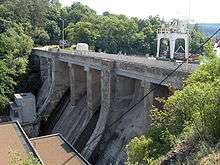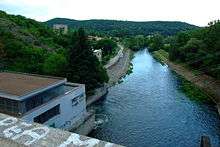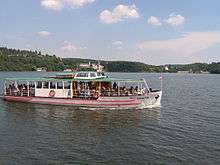Brno Reservoir
| Brno Reservoir Brněnská přehrada | |
|---|---|
|
View of Brno Reservoir | |
| Location | Brno, South Moravia |
| Coordinates | 49°14′18″N 16°30′29″E / 49.23833°N 16.50806°E |
| Type | reservoir |
| Primary inflows | Svratka |
| Primary outflows | Svratka |
| Basin countries | Czech Republic |
| Surface area | 259 hectares (640 acres) |
| Average depth | 23.5 metres (77 ft) |
| Water volume | 7 600 000 m³ |
| Surface elevation | 233.72 metres (766.8 ft) |
| Settlements | Brno |
The Brno Reservoir, previously known as the Kníničky Reservoir (Czech: Brněnská přehrada, also known as Prýgl in Hantec slang) is a dam on the Svratka River right outside the city of Brno, Czech Republic. The construction of a levee on the 56th river kilometre of the Svratka River, together with flooding of a valley with the Kníničky village in, created the Brno Reservoir. The reservoir used to serve as a water reserve for Brno (water from the Vír Dam and from water wells in Březová nad Svitavou are used today), a place for recreation, and also a source of electric power. Administrator of the Brno Reservoir is a state-owned enterprise Povodí Moravy, s.p.
Basic Information


The idea of creating a dam on the Svratka River began at the beginning of the 20th century; however, its reconstruction was realized as late as 1936–1940. The main investor was the then Ministry of Public Works. Apart from Brno, it was also “the Moravian-Silesian Land” (a former territory), which took a financial interest of 25% in it.
The water storage begins under the weir at the Tejkalův Mill in Veverská Bítýška and spans nearly 10 km to the dyke on the border of the Brno-Bystrc and Brno-Kníničky districts. The flooded area covers 259 ha. The inactive storage reaches up to 7.6 million m³; the reserve space is 10.8 million m³. The concrete solid dam is 7.14 m wide in corona and 120 m long. It rises 23.5 m above the bottom at an altitude of 233.72 m.
Hydroelectricity uses one Kaplan turbine with an output of 2.88 MW (the installed output is 3.1 MW). In case of an island operation (that is, independently, disconnected from network system, such as in case of a breakdown of the electric power transmission), the turbine can be used to set a gas combustion turbine in the heating plant “Červený mlýn” in motion. A small hydro in Brno-Komín serves as a buffer tank.
At the end of the Second World War the retreating German Army placed mines in the nearby roads, a barrel with trinitrotoluene on the levee (the explosives were originally supposed to be placed into the levee piping, but it was sealed with concrete due to an order to protect it from a sabotage), and also placed some machine guns in the house of the levee guard Šikula. The guard, together with a few people hidden in the power plant room, warned a convoy of the Red Army, but Šikula was shot and wounded. There is a plaque of his at the levee today.
Tourism

Brno Reservoir is a popular recreational area with both locals and visitors. There are vast forests on both sides of the reservoir and thus there are opportunities not only for swimming and water sports, but also hiking and cycling. The Veveří Castle is a popular destination for tourists, too. It rises over a rock close to Veverská Bítýška. There is a bridge for cyclists and hikers over the dam close to the castle.
The dam can be visited all year round. Swimming in the water is safe. Blue-green bacteria very rarely occur on the southern tip of the dam only.
Culture
.jpg)
There is an important international firework competition Ignis Brunensis that is held annually at the end of May and beginning of June at the Brno Reservoir.
Pollution
As a result of water pollution by communal sewage, the dam suffered from an extensive amount of blue-green bacteria for a long time. In 2010 the reservoir underwent a series of cleaning by chemical substances against the bacteria. These cleanings remain a subject of criticism and dispute, as some people claim they were nothing more than a pre-election trick, and that they will not bring any sufficient results in the long run. Since 2011, however, the water in the reservoir has been suitable for swimming.
Boat rides
The Brno Public Transportation Office operates boat rides on the reservoir during summer season. The boats run from Bystrc harbour (“Přístaviště”) to Veveří Castle and some even to Veverská Bítýška (depending on water level). There are operating several new boats – Lipsko, Utrecht, and Vídeň – which are named after Leipzig, Utrecht and Vienna (twin towns of Brno); and older ones called Brno, Dallas, and Veveří. The boats run every 45 minutes. Tickets can be purchased in the harbour at the ticket office.
Sport
The reservoir serves as a popular place for sports, too. Apart from canoeing, water skiing, and yachting, the dam is also used for rowing. Several rowing clubs operate there, such as ČVK Brno (Czech Rowing Club Brno) or TJ Lodní sporty Brno (TJ Water Sports Brno), with its most famous member Miroslava Knapková (the winner in rowing at the 2012 Olympics).
Events
Since 2011 there has been a dispute over a planned construction of a wakeboarding track.
External links
-

Wikimedia Commons has media related to Brno Reservoir. - Prygl.net - Brno Dam and its surroundings - tourist information, current events, photographs
- http://www.facebook.com/brnenskaprehrada Official Facebook website of the Brno with actual water quality informations
- http://www.pmo.cz/cz/uzitecne/vodni-dila/brno/ – informations about the Brno reservoir on official web site of Povodí Moravy